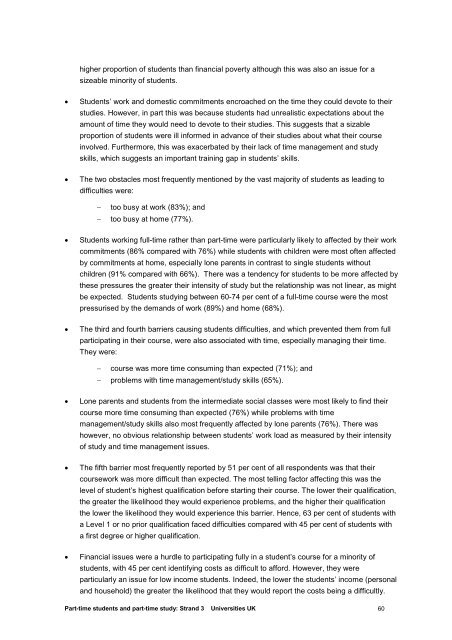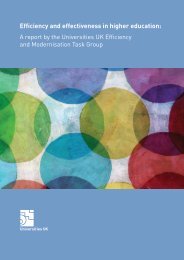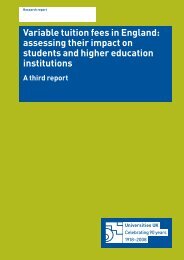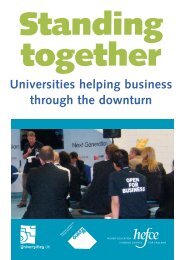Part-time Students And part-time Study In Higher ... - Universities UK
Part-time Students And part-time Study In Higher ... - Universities UK
Part-time Students And part-time Study In Higher ... - Universities UK
Create successful ePaper yourself
Turn your PDF publications into a flip-book with our unique Google optimized e-Paper software.
higher proportion of students than financial poverty although this was also an issue for asizeable minority of students.• <strong>Students</strong>’ work and domestic commitments encroached on the <strong>time</strong> they could devote to theirstudies. However, in <strong>part</strong> this was because students had unrealistic expectations about theamount of <strong>time</strong> they would need to devote to their studies. This suggests that a sizableproportion of students were ill informed in advance of their studies about what their courseinvolved. Furthermore, this was exacerbated by their lack of <strong>time</strong> management and studyskills, which suggests an important training gap in students’ skills.• The two obstacles most frequently mentioned by the vast majority of students as leading todifficulties were:− too busy at work (83%); and− too busy at home (77%).• <strong>Students</strong> working full-<strong>time</strong> rather than <strong>part</strong>-<strong>time</strong> were <strong>part</strong>icularly likely to affected by their workcommitments (86% compared with 76%) while students with children were most often affectedby commitments at home, especially lone parents in contrast to single students withoutchildren (91% compared with 66%). There was a tendency for students to be more affected bythese pressures the greater their intensity of study but the relationship was not linear, as mightbe expected. <strong>Students</strong> studying between 60-74 per cent of a full-<strong>time</strong> course were the mostpressurised by the demands of work (89%) and home (68%).• The third and fourth barriers causing students difficulties, and which prevented them from full<strong>part</strong>icipating in their course, were also associated with <strong>time</strong>, especially managing their <strong>time</strong>.They were:− course was more <strong>time</strong> consuming than expected (71%); and− problems with <strong>time</strong> management/study skills (65%).• Lone parents and students from the intermediate social classes were most likely to find theircourse more <strong>time</strong> consuming than expected (76%) while problems with <strong>time</strong>management/study skills also most frequently affected by lone parents (76%). There washowever, no obvious relationship between students’ work load as measured by their intensityof study and <strong>time</strong> management issues.• The fifth barrier most frequently reported by 51 per cent of all respondents was that theircoursework was more difficult than expected. The most telling factor affecting this was thelevel of student’s highest qualification before starting their course. The lower their qualification,the greater the likelihood they would experience problems, and the higher their qualificationthe lower the likelihood they would experience this barrier. Hence, 63 per cent of students witha Level 1 or no prior qualification faced difficulties compared with 45 per cent of students witha first degree or higher qualification.• Financial issues were a hurdle to <strong>part</strong>icipating fully in a student’s course for a minority ofstudents, with 45 per cent identifying costs as difficult to afford. However, they were<strong>part</strong>icularly an issue for low income students. <strong>In</strong>deed, the lower the students’ income (personaland household) the greater the likelihood that they would report the costs being a difficultly.<strong>Part</strong>-<strong>time</strong> students and <strong>part</strong>-<strong>time</strong> study: Strand 3 <strong>Universities</strong> <strong>UK</strong> 60
















